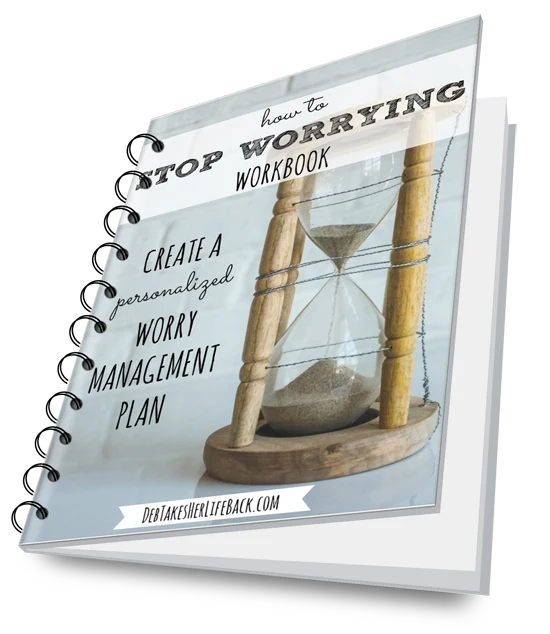Let’s be honest, sometimes talking about our problems just feels good. It provides a sense of validation and support from those listening and allows us the opportunity to blow off some steam.
But whenever I find myself constantly talking about my problems, it’s almost as if my problems get worse. They feel heavier and more impactful than they should, given the circumstances.
Here’s why I’m a firm believer that we should stop talking about problems so much, and exactly how to do that.

Why to Stop Talking About Problems
It creates more and worse problems.
The more we talk about something, the more we perpetuate that something.
So when I constantly complain about someone, I eventually adopt a mindset toward them in which I’m actively looking for their faults. Anything they say or do can and will be held against them, no matter what their actual intention.
It makes it difficult to move forward.
I know this firsthand. I found that no matter how much I wanted to embrace life after divorce, I simply couldn’t.
The problem was that every time I talked about my divorce with someone, it forced me to relive the experience all over again, sinking me back into heartache and anger. It wasn’t until I stopped reliving it over and over in my conversations that I was able to move forward.
It gives your problems power over you.
Sure, talking through an issue with a trusted friend or family member can help you work toward a resolution. But we’re not always talking to resolve an issue, are we? We’re often simply venting.
And the more I vent about a negative experience, the more frustrated, angry, and anxious I feel. I’m giving more power to that bad experience than it should hold over me.
It brings you down.
Your mental, emotional, and even physical health suffer when you’re constantly chewing on negativity. It’s science!
And who wants to live in a constant state of hurt or anger anyway? Probably not you.
Continuing to talk about problems creates a low-lying black cloud that follows us everywhere we go.
It brings others down.
Our black cloud doesn’t just follow us.
I once had a friend who only seemed capable of discussing everything that went wrong. Every conversation came back to her and her problems.
“Oh, your boyfriend just proposed? That’s wonderful. I wish my boyfriend would. Did I tell you about our fight yesterday?”
Frankly, it was a bummer. And it made me feel as if she didn’t actually care about me beyond my usefulness as a sounding board.

How to Stop Talking About Problems
So how can we stop talking about problems so much? With a little practice, we can begin to recognize and correct this often deeply-embedded habit.
Be selective about your problems.
Of course, please talk about your divorce or serious illness or the death of a loved one!
But is it necessary to discuss that “idiot” that cut you off on your morning commute? Or how much you hacked out of your throat this morning?!
Some negative experiences are common to everyone, and not all that necessary to discuss. Save your breath for weightier problems and let the smaller things go.
Determine a healthy amount of time to vent, then promise yourself any discussion beyond that has to be productive.
Talking about your problems can help you to unload negative emotions. But promise yourself that beyond 24-48 hours, any further discussion of your problems must be productive.
Productive discussion involves deciding on next steps and making a plan to move forward. As marriage and family therapist Hal Runkel says, “Talking about our problems is not healthy; talking through them is.”
Change the topic.
Consider making a mental (or even physical!) list of non-problem-related topics and review it quickly prior to engaging in conversation with others. Watch for verbal or nonverbal cues that it’s time to switch topics, and move on in the conversation.
It will not only lighten the mood but make you an even better and more engaging conversationalist.
Ask about your friends’ lives and listen sincerely to their answers.
This sounds pretty basic, but is easy to forget when you’re caught up in your own problems. Making it a point to ask questions about your friends’ lives shows them that they’re important to you, and also helps to shift your focus away from your problems for a while.
While you’re at it, resist the urge to turn their answers back around to you. “Oh, your husband stressed you out? I wish I had it that easy. My husband…”
Take up a new hobby.
Many people lean into their problems and drama to feel important and more alive. Talking about their problems gives them something interesting to share in a conversation when they don’t feel much else is going on in their lives.
If that’s you, try something new, like crafting, reading, or running. Take the time to rediscover your personal interests or participate in fun local activities.
Then you’ll have lots of interesting conversation starters without having to fall back on old drama.
Consider enlisting the help of a therapist.
You may find that your friends don’t know how to respond to your problems beyond agreeing or empathizing. Unloading on a therapist can feel much more useful, as they work to help you balance your mindset, find a resolution, and create a plan for moving forward.
Many people also find that talking with a therapist frees up their thoughts and worries enough to hold more normal, give-and-take conversations with their loved ones. (I use and highly recommend TalkSpace! Use this link to get $200 off.)
Start a journal.
Writing can be incredibly therapeutic. I know!
It allows you to sort through your unedited thoughts, since you’re not worried about anyone taking something you say the wrong way. It can also help you to identify unhealthy thought patterns and increase self-awareness.
There have been many times I’ve told myself a problem is relatively new (and not really that serious), only to realize I started writing about the problem several years ago. Seeing the longevity and weight of an issue gives me the push I need to address it once and for all so I can move on with my life.
Volunteer.
Nothing turns my attitude around quite like volunteering. It reminds me that there is always someone worse off.
While I worry about my daughter’s reading skills, another mother is wondering how she’s going to feed her daughter tonight. While I moan about my love handles, someone else is battling a life-threatening disease.
Volunteering puts things into perspective and provides an opportunity to help someone else. It’s really a win-win.

Constantly talking about our problems doesn’t benefit us, or our lives, one bit. The good news is that we can train ourselves to stop talking about problems so much!
By being mindful of the topic and timeframe, and unloading our problems in other ways, we can stop talking about problems as often, and prevent our problems from controlling our lives.
You’ve got this, friend!

P.S. Do you talk about your problems so much because you’re worried about them? Then download our free ebook to help you curb your worrying for good!
Disclosure: While all opinions are our own, we are a participant in the Amazon Services LLC Associates Program and other affiliate advertising programs, designed to provide a means for us to earn fees by linking to Amazon.com and affiliated sites, at no additional cost to you.




Tammy
Thursday 19th of June 2025
On journaling.. "It allows you to sort through your unedited thoughts, since you’re not worried about anyone taking something you say the wrong way. It can also help you to identify unhealthy thought patterns and increase self-awareness"
I need to journal to edit my thoughts? For who? Why? What is the right way? For who? Why? And now I need to worry if my thoughts are unhealthy? This book should be called, "How to worry about things and obsess like never before!". Better still, "Not worried you talk too much and are annoying? You should be." For holy moly sakes don't buy this book! It sounds completely awful.
My opinion on journaling is do for yourself, this is NOT a test, YOU DON'T NEED TO MONITOR UNHEALTHY THOUGHT PATTERNS IN YOUR OWN JOURNAL MY GOD
Deb
Friday 20th of June 2025
The whole idea of this blog post (I apologize, I'm not sure which book you're referring to.) is to learn to edit your thoughts for your own sake, since dwelling on your problems can create more problems, make it difficult to move forward, bring you down, etc. If you're happy with the state of your mind and thoughts, then no need to spend time processing them or journaling through them. But for those on a quest to improve their mindset, journaling provides a scientifically validated tool for improving mental health and well-being. The beauty of journaling is that there are no rules - you can vent in your journal, process your emotions, document your day, write poetry, draw, anything! 😀